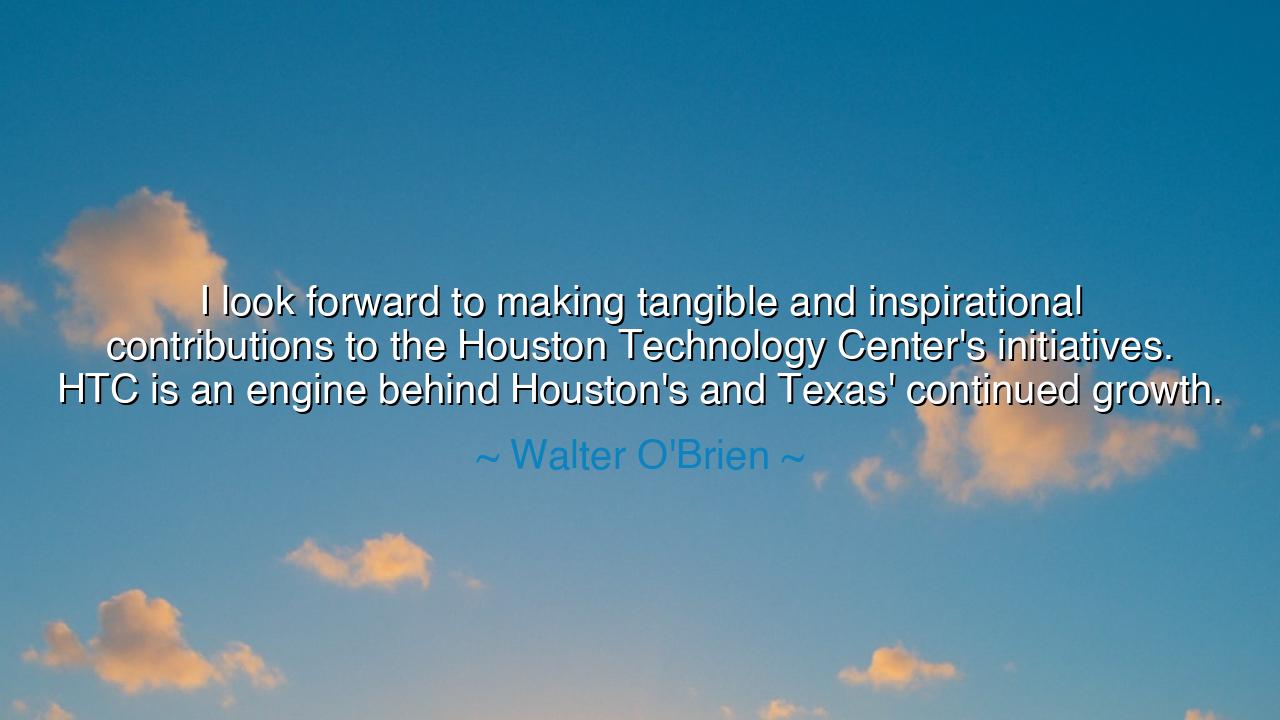
I look forward to making tangible and inspirational contributions
I look forward to making tangible and inspirational contributions to the Houston Technology Center's initiatives. HTC is an engine behind Houston's and Texas' continued growth.






In the words of Walter O’Brien, a visionary of intellect and innovation, we hear both humility and purpose: “I look forward to making tangible and inspirational contributions to the Houston Technology Center’s initiatives. HTC is an engine behind Houston’s and Texas’ continued growth.” Though his tone is measured and modern, the sentiment within carries the weight of ancient wisdom. It speaks of service, of creation, and of the eternal truth that progress, whether of a city or of civilization itself, is driven by the joined hands of dreamers and doers. Here, O’Brien is not merely expressing professional anticipation; he is echoing the timeless vow of those who dedicate their gifts not for vanity, but for the betterment of mankind.
The meaning of his words lies in the sacred union between inspiration and tangibility. Many throughout history have dreamed grandly yet achieved little, while others have built greatly yet forgotten the soul of their labor. O’Brien’s vision reconciles these two paths — to make progress both practical and uplifting, both material and moral. His phrase “tangible and inspirational contributions” reminds us that true achievement must be felt in both hand and heart. What use is technology that moves the world if it does not also move the spirit? What good is innovation if it serves only the machine, and not the man? Thus, in this reflection, O’Brien reminds the world’s builders that purpose is the soul of progress.
The origin of his insight can be traced to the deep lineage of thinkers who saw innovation as a form of stewardship. In ancient Alexandria, Archimedes did not invent merely for himself; his genius served the defense and growth of his city. In the Renaissance, Leonardo da Vinci saw art and engineering not as isolated crafts but as sacred instruments of understanding — ways to align the human mind with divine order. So too does O’Brien’s commitment to the Houston Technology Center (HTC) stand as a continuation of this lineage. The center, like the libraries and academies of the past, is not just a hub of machinery but a forge of minds, where intellect becomes energy and vision becomes reality.
When O’Brien calls HTC an “engine behind Houston’s and Texas’ continued growth,” he invokes a metaphor that transcends mechanics. The engine, in this sense, is the human spirit organized for a higher goal. It is the collective pulse of collaboration, innovation, and courage. Just as the ancient city of Athens rose through its thinkers and artisans, so too does Houston — and indeed all societies — ascend through its inventors, scientists, and entrepreneurs. The “engine” is not made of metal, but of imagination. Its fuel is curiosity, its power is unity, and its direction is determined by the moral compass of those who lead it.
There is also humility in O’Brien’s words. To “look forward” to contributing is to acknowledge that one’s work is not yet done, that there is always another height to reach, another horizon to expand. This humility echoes the wisdom of the old masters who knew that knowledge without service is emptiness. Consider Marcus Aurelius, the philosopher-emperor, who wrote that the worth of a man lies in what he contributes to the common good. Like Aurelius, O’Brien speaks from a place of responsibility — understanding that intellect, like power, is a trust to be used wisely and generously.
His use of the word “inspirational” reminds us that progress without inspiration is mechanical, lifeless. A machine may move the body, but only inspiration moves the soul. Throughout time, it has been the inspired — not merely the intelligent — who have transformed the world. Galileo, Madame Curie, Steve Jobs — each blended reason with wonder, logic with faith. Inspiration is the bridge between mind and heart, between creation and compassion. In aspiring to make his work inspirational, O’Brien affirms that true innovation must also awaken the best in those who witness it.
The lesson within this quote, then, is both ancient and urgent: that the future belongs not to those who invent merely to conquer, but to those who innovate to uplift. Each of us, in our own sphere, must strive to make our contributions both tangible and inspirational — to build things that endure, but also to ignite hope that renews. Whether we are scientists, artists, teachers, or builders, our duty is to move the world forward without losing the humanity that binds it.
Therefore, let this reflection guide all who create: Do not labor for profit alone, but for purpose. Do not pursue progress without beauty, nor knowledge without compassion. Be like Walter O’Brien, who looks to the future not as a prize, but as a responsibility. For when work is both tangible and inspirational, it ceases to be mere labor — it becomes legacy. And legacy, when born of wisdom and humility, becomes the truest engine of human growth.






AAdministratorAdministrator
Welcome, honored guests. Please leave a comment, we will respond soon